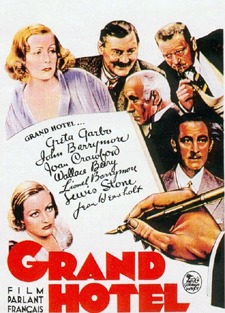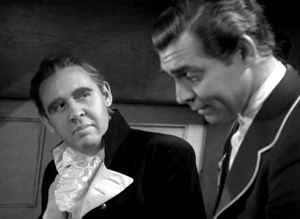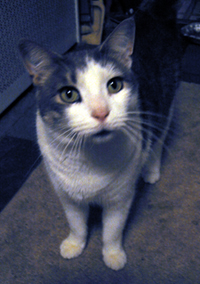Musings
an Online Journal of Sorts
By Alyce Wilson
June 10, 2008 - Hotel Mutiny

As regular readers know, I am trying to watch all the movies that have won Best Picture at the Academy Awards.
Next on my list was the winner for 1931/32, Grand Hotel, directed by Edmund Goulding and starring Greta Garbo, John Barrymore, Joan Crawford, Wallace Beery, Lionel Barrymore.
The other films that received votes that year were Arrowsmith, Bad Girl, The Champ, Five Star Final, One Hour With You, Shanghai Express and The Smiling Lieutenant.
The back story of Grand Hotel is almost more interesting than the film itself. For the film, the producers pulled together a cast that included screen legend Greta Garbo and young starlet Joan Crawford, a combination that would lead to trouble on the set.
Most of the actors worked together very well, but Garbo feared that Crawford would steal the film, perhaps fearing her glory days were coming to an end. You can see a difference in their acting styles. Garbo, who utters the famous line "I want to be alone," plays a temperamental ballet prima donna, Grusinskaya, who won't perform unless she can be guaranteed a standing ovation. Her acting is grandiose, with big movements that hearken back to her early days as a silent-film actress.
Grusinskaya falls for John Barrymore's Baron Felix von Geigern, a thief who steals her heart while trying to steal her pearls. He strives throughout the film to steal enough goods to settle a debt with some unsavory characters, but his kind heart is his undoing.
By contrast to Garbo's acting, Crawford's is understated. Yet, her role is more substantial. She gets more lines, and she's on-screen more often, moving the action along in a couple of different story lines. Crawford plays a stenographer, Flaemmchen, who must decide whether to give in to her boss's advances for the promise of extra cash. She also falls for the Baron.
While the film was being shot, Garbo actively snubbed Crawford backstage. Every time Crawford said hello, Garbo turned up her nose as if she hadn't heard. Finally, Crawford stopped trying, which irritated Garbo, who demanded to know why she hadn't said hello. In part out of necessity, the director kept the two actresses apart. Yet, Grand Hotel is an ensemble film, so it's easy to overlook the fact that the two actresses never appear on screen together.
Despite, or perhaps because of, these backstage antics, the movie did quite well. It's a classic Hollywood film, notable for weaving different story lines together. Films like this would inspire such movies as Robert Altman's Short Cuts, where different stories are eventually interwoven. In this movie, the connection is more obvious, as all the characters are staying in the same hotel and have, at first, tangential and then more substantial interactions.
The cinematography is gorgeous, the sort of black and white that makes use of every tone, from the whitest white to the blackest black. The sets were suitably grand, built just for the movie in an Art Deco style. For the most part, the story is entertaining, although parts of it feel terribly dated. Today's viewers, for example, might wonder why everyone seemed to assume that Flaemmchen was a bit of a loose women. Is it simply because she is outspoken? Because she's a stenographer, working in a hotel room alone with her boss? It certainly can't be her clothing: the most she ever shows is her ankles and maybe a little clavicle!
The script boasts some unforgettable dialogue, such as the banter between Flaemmchen and the Baron when they first meet. And of course, those loving, gel-softened close-ups of Garbo as she intones lines we've had engraved on our collective subconscious. Truly, it's a star-studded spectacle that epitomizes the golden age of Hollywood.
Rating (out of 5): ****
The winner for 1932/33 was a movie called Cavalcade, which is not available either through Blockbuster.com or from Amazon.com, except for a couple suspicious listings which appear to be bootlegs. Interestingly, Cavalcade competed for votes with a number of better known films, including 42nd Street, Little Women, Farewell to Arms and the Mae West-Cary Grant picture, She Done Him Wrong.
The 1934 winner was It Happened One Night, the classic Frank Capra movie starring Clark Gable and Claudette Colbert. It won out over The Barretts of Wimpole Street, Cleopatra, Flirtation Walk, The Gay Divorcee, Here Comes the Navy, The House of Rothschild, Imitation of Life, One Night of Love, The Thin Man, Viva Villa! and The White Parade.
I saw It Happened One Night in a film theory class in college. It's a lighthearted romantic comedy, with excellent storytelling that focuses on the two leads. If you haven't seen it, it's well worth watching. It still ranks as one of the best romantic comedies ever made.
 The
1935 winner, Mutiny on the Bounty, was directed by Frank Lloyd
and starred Charles Laughton as Captain William Bligh and Clark Gable
as the leader of the mutineers, First Lieutenant Fletcher Christian. It
won Best Picture, receiving more votes than the second-place choice, The
Informer, the third-place choice, Captain Blood, as well as
Alice Adams, Broadway Melody of 1936, David Copperfield, Les Miserables,
The Lives of a Bengal Lancer, A Midsummer Night's Dream, Naughty Marietta,
Ruggles of Red Gap and Top Hat.
The
1935 winner, Mutiny on the Bounty, was directed by Frank Lloyd
and starred Charles Laughton as Captain William Bligh and Clark Gable
as the leader of the mutineers, First Lieutenant Fletcher Christian. It
won Best Picture, receiving more votes than the second-place choice, The
Informer, the third-place choice, Captain Blood, as well as
Alice Adams, Broadway Melody of 1936, David Copperfield, Les Miserables,
The Lives of a Bengal Lancer, A Midsummer Night's Dream, Naughty Marietta,
Ruggles of Red Gap and Top Hat.
Neither The Gryphon nor I had seen Mutiny on the Bounty all the way through, although as we watched it, we realized we'd seen many clips from it. The movie tells the story of an historical rebellion that took place on a British ship sent to the West Indies to acquire breadfruit trees to feed slaves. The ship never returned, because of an uprising against the tyrannical leadership of Captain Bligh, played by Charles Laughton.
Laughton plays Bligh as a humorless thug who, in his first scene, insists on administering 300 lashes to a dead sailor, simply because he'd been sentenced to that punishment. Bligh doesn't get any more sympathetic as the movie rolls along. At times, his heavy-handed leadership seems justified by harsh conditions, but the brutal way he dispenses justice and his callous disregard for his sailors' well-being further alienate him from his crew.
Meanwhile, the crew members draw close to Christian, who does what little he can to ease their discomfort. So when they've finally had enough, they appeal to him, and he rails against the captain's injustice, taking over the ship and putting Bligh out, along with the first officers, in a small row boat. I won't spoil the ending for you, should you care to see it.
The movie is extremely slow-paced, clocking in at 132 minutes, of which at least 45 could easily have been trimmed. This makes the viewer all the more anxious for the mutiny they know is coming, but which doesn't take place until more than halfway through.
Laughton imbues the role with a stern severity, unlike the almost rakish turn that appears to have been taken by Trevor Howard in the 1962 remake that starred Marlon Brando. I am judging this simply from having seen the preview, which came as an extra on the DVD.
Clark Gable's Christian smirks in typical Clark Gable fashion, but the character seems like it should have been played a bit darker, in contrast to the naiveté Gable's Christian sometimes evinces. Certainly, this was a different role for Gable, who is better known for his roles as a charming, if often edgy, romantic lead.
The movie features some striking cinematography. The scenes on the ship are high-contrast and bleak, compared with the warm, evocative shots of Tahiti, where the ship lands. Those shots are as breathtaking as the color extravaganza glimpsed in the 1962 remake.
Mutiny on the Bounty was an historic film, and therefore viewed, no doubt, as important, and it starred one of the biggest stars of the day. While the movie may be slow going in the first half, it's worth watching through to the end.
Rating (out of 5): ***
Musings on Best Picture Winners
As I said yesterday, my Mom is looking for homes for some cats she's been feeding and providing with medical care, since she can no longer keep all of them.
I've offered to post their pictures, with a little description of each one, in hopes that someone who reads this can give them a home. If you know anyone who might be interested, please let me know.
Name:
Mickey
Age: 3 years
Neutered with all shots
Mickey is gentle and is good friends with his litter mates, such as Melvin, whose picture was posted yesterday. Like his brother, he also has black lips, but he also has an adorable pink nose.
Moral:
Cast more than one diva in a movie and you're asking for trouble.
Copyright
2008 by Alyce Wilson
What
do you think? Share your thoughts
at Alyce's message board (left button):
![]()
![]()


